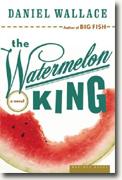The Watermelon King
Daniel Wallace
book reviews:
· general fiction
· chick lit/romance
· sci-fi/fantasy
· graphic novels
· nonfiction
· audio books
· author interviews
· children's books @
curledupkids.com
· DVD reviews @
curledupdvd.com
newsletter
win books
buy online
links
home
for authors
& publishers
for reviewers

 |
The Watermelon King Daniel Wallace Mariner Books Paperback 240 pages November 2003 |
|
While the city of Ashland, Alabama, exists in the real world (it is seat of Clay County with a 2000 census population of 1,965), Daniel Wallace has been fictionalizing it and its people since his first novel, Big Fish. Providing as much a sense of place and background as William Faulkner’s Yoknapatawpha County, Ashland is a small-town suburb of Birmingham, Alabama, where folks either get out or die trying. In Wallace’s third and most recent novel, The Watermelon King, readers are invited back to Ashland for a new adventure of mythological proportion.
Thomas’ voice appears at first as an almost omniscient Greek chorus where our only real knowledge of him is as the recorder of each townsperson’s story. From the local innkeeper, realtor, festival committee chair, carpenter, and pharmacist to the town widow, negro, and idiot, the majority of the town’s and Lucy’s past as well as Thomas’ beginning is discovered, and the varied personalities are established. Part Two brings the reader reminisces of Thomas’ childhood and is most like Big Fish, relying on the father/son (or in this case the grandfather/grandson) bond and on oral storytelling traditions. Some of the interactions between Thomas and his grandfather parallel imagery and symbolism in Wallace’s previous novels including Thomas’ grandfather’s tendency to stretch the truth a bit and a story about Thomas’ ability to communicate with the natural world and an extraordinary comfort level underwater. Wallace also details visits to a neighbor who traditionally gives Thomas a lucky dime as a Christmas gift, which shadows a different grandfather’s lucky penny found in Wallace’s second novel, Ray in Reverse. Both parallels serve as foundations in Wallace’s carefully constructed town of Ashland, where lucky coins symbolize the willingness and innocence of a child’s trust and faith in his loved ones, while stories of people moving easily between the human world and the natural world mirror old Greek stories where mortals are sometimes given the ability to walk among the gods. As Thomas matures he begins to tire of his grandfather’s elaborate responses to every question Thomas asks about who he is and who his mother was. Thomas realizes, along with the reader, that although his grandfather has defined himself by his stories, it has also been his sole means of avoiding the bare truth. Thomas is forced to watch this tragic flaw become his grandfather’s demise: “Because he was not made out of flesh and blood: he was made up mostly of stories, a high-wire act of a life balanced on the suspension of disbelief, and as he became deprived of his stories he actually seemed to shrink.”Part Three thrusts the reader back into present-day Ashland, where the Watermelon Festival is getting under way. The festival, in which a virginal Watermelon King is chosen to sacrifice his virginity to ensure the fertility of the town’s soil and a healthy watermelon crop, bares resemblance to Shirley Jackson’s “The Lottery”. Followed by a plethora of folklore, mythology, and biblical symbolism, the reader is lead down the path towards surprising, albeit somewhat open-ended, conclusions. Wallace’s use of biblical symbolism as we watch Thomas, the prodigal son, turn into a savior - complete with a last supper - and symbolic crucifixion contrasts with the heavily weighted symbolic comparisons of Lucy as a Greek goddess or an otherworldly siren whose Electra complex causes a swift fall and return the harsh realities of mortality. Wallace’s multi-layered story unfolds as slowly and seamlessly as the petals of a flower and is immensely pleasurable to read. His foundation for Ashland is solidified in The Watermelon King, and fans of his work are surely looking forward to the next development in a world that is both recognizable and yet fantastic. Originally published on Curled Up With A Good Book at www.curledup.com. © Jessica Ferguson, 2004 |
|
|
|
 Click here to learn more about this month's sponsor! |
|
| fiction · sf/f · comic books · nonfiction · audio newsletter · free book contest · buy books online review index · links · · authors & publishers reviewers |
|
| site by ELBO Computing Resources, Inc. | |
 Divided into four distinct sections, The Watermelon King begins with our hero, eighteen-year-old Thomas Rider, setting out on the ultimate quest in search of the details of the life and death of his mother, Lucy, in the hopes that he will find out who she was and who he is. While not a terribly original premise, one mustn’t be discouraged. Wallace is becoming a master of modern-day mythology, and while the novel is a journey of discovery, there is plenty of symbolism and diversion to maintain one’s interest.
Divided into four distinct sections, The Watermelon King begins with our hero, eighteen-year-old Thomas Rider, setting out on the ultimate quest in search of the details of the life and death of his mother, Lucy, in the hopes that he will find out who she was and who he is. While not a terribly original premise, one mustn’t be discouraged. Wallace is becoming a master of modern-day mythology, and while the novel is a journey of discovery, there is plenty of symbolism and diversion to maintain one’s interest.